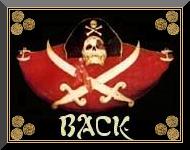
Captain John Callice
 Born in southeastern Wales, Callice moved to London as a youth, became a retailer and sailor, and joined the navy in about 1571. In early 1574, while commanding a royal ship, he seized an Italian merchantman and sold her cargo in Cardiff and Bristol. For the next four years, Callice plundered mercilessly, and other captains sailed under his leadership. Arrested in May 1577, Callice was imprisoned in London and charged with six major cases of piracy and many minor ones. He was sentenced to hang for the six important crimes, which occurred near Cornwall, off France and Denmark, and as far south as the Azores. Callice normally disposed of his booty in Wales, where he was intimate with local landowners and royal officials, including the Vice-Admiral. He apparently had friends of even higher status, for Queen Elizabeth pardoned him in November 1577 at the request of Scotland's king.
Born in southeastern Wales, Callice moved to London as a youth, became a retailer and sailor, and joined the navy in about 1571. In early 1574, while commanding a royal ship, he seized an Italian merchantman and sold her cargo in Cardiff and Bristol. For the next four years, Callice plundered mercilessly, and other captains sailed under his leadership. Arrested in May 1577, Callice was imprisoned in London and charged with six major cases of piracy and many minor ones. He was sentenced to hang for the six important crimes, which occurred near Cornwall, off France and Denmark, and as far south as the Azores. Callice normally disposed of his booty in Wales, where he was intimate with local landowners and royal officials, including the Vice-Admiral. He apparently had friends of even higher status, for Queen Elizabeth pardoned him in November 1577 at the request of Scotland's king.
 Callice was paroled in July 1578 but soon fled and became a pilot for Sir Henry Knollys in Sir Humphrey Gilbert's expedition. Gilbert planned to plunder the Spanish Caribbean, but Knollys and Callice instead attacked ships in English waters. From 1580, Callice raided in the north (he captured two ships near Hamburg, Germany) but continued to visit Wales. In August 1582, he was appointed captain by William Fenner, who had a commission to arrest pirates at sea. In March 1583, Callice instead looted two Scottish merchantmen and took their cargo to Portsmouth. He kept one Scottish prize renamed the Golden Chalice but abandoned her soon after to avoid arrest. The ship passed to Sir Humphrey Gilbert and formed part of his 1583 Newfoundland expedition.
Callice was paroled in July 1578 but soon fled and became a pilot for Sir Henry Knollys in Sir Humphrey Gilbert's expedition. Gilbert planned to plunder the Spanish Caribbean, but Knollys and Callice instead attacked ships in English waters. From 1580, Callice raided in the north (he captured two ships near Hamburg, Germany) but continued to visit Wales. In August 1582, he was appointed captain by William Fenner, who had a commission to arrest pirates at sea. In March 1583, Callice instead looted two Scottish merchantmen and took their cargo to Portsmouth. He kept one Scottish prize renamed the Golden Chalice but abandoned her soon after to avoid arrest. The ship passed to Sir Humphrey Gilbert and formed part of his 1583 Newfoundland expedition.
 In 1584, William Fenner was licensed to take Spanish and Portuguese prizes, and Callice served as his lieutenant. In December, Callice took command of a captured French warship and was separated from Fenner in foul weather. Although he was arrested in Ireland, he soon was released or escaped and captured several French vessels. By 1585, Callice apparently felt that Wales and Ireland no longer were safe havens. He henceforth operated from the Barbary States, and was killed in the Mediterranean in 1586 or 1587.
In 1584, William Fenner was licensed to take Spanish and Portuguese prizes, and Callice served as his lieutenant. In December, Callice took command of a captured French warship and was separated from Fenner in foul weather. Although he was arrested in Ireland, he soon was released or escaped and captured several French vessels. By 1585, Callice apparently felt that Wales and Ireland no longer were safe havens. He henceforth operated from the Barbary States, and was killed in the Mediterranean in 1586 or 1587.

Reference Sources